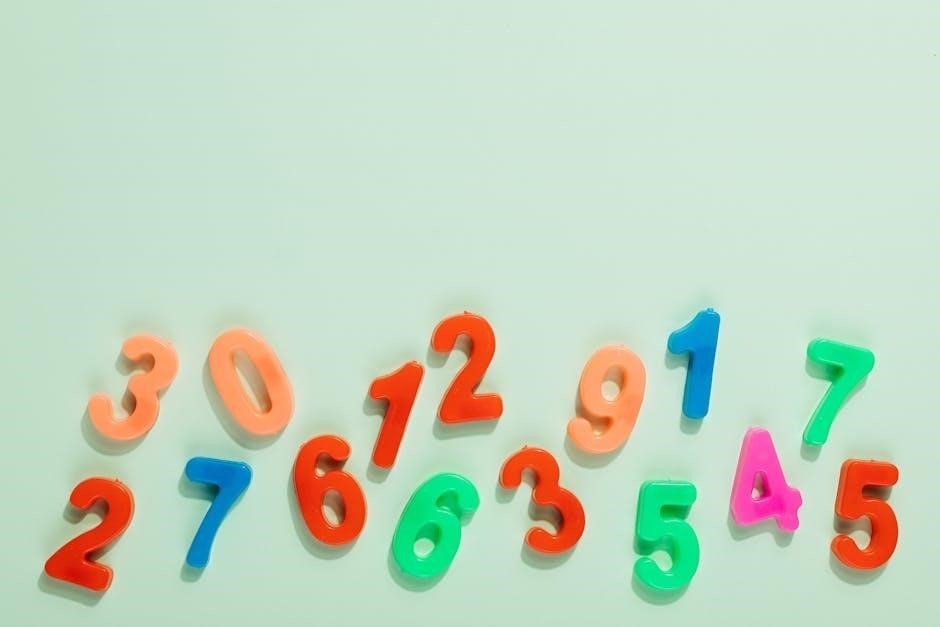Engage young learners with fun, interactive math activities designed for 3-5 year olds. Explore counting games, shape hunts, and basic operations through play-based learning. Download free PDF resources for worksheets, games, and guides to support early math development at home or in the classroom.

Why Early Math Skills Are Important
Early math skills are crucial for building a strong foundation in problem-solving and logical thinking. They help children understand the world around them through counting, shapes, and patterns. Developing these skills fosters a positive attitude toward math and enhances cognitive development. Research shows that early math proficiency correlates with future academic success and real-world problem-solving abilities. By introducing math concepts in a fun and engaging way, young learners gain confidence and critical thinking skills essential for lifelong learning.
Benefits of Interactive Math Activities for Young Children
Interactive math activities offer numerous benefits for young children. They promote active learning, fostering curiosity and creativity while developing essential math skills. These activities encourage problem-solving, hand-eye coordination, and critical thinking. By engaging in hands-on experiences, children build confidence and a positive attitude toward math. Interactive games also enhance social skills through collaboration and communication. Moreover, they make learning fun, which increases motivation and retention of math concepts. With affordable and accessible materials, parents and educators can easily incorporate these activities into daily routines, providing children with a solid foundation for future academic success.


Number Recognition and Counting Activities
Engage young learners with interactive counting games and number recognition tasks. Use everyday objects like toys, blocks, and fruits to make learning fun and relatable for children.
Counting Games Using Everyday Objects
Transform everyday objects into engaging math tools for young learners. Use items like toys, fruits, or blocks to create interactive counting games. For instance, count apples in a basket or blocks in a tower. These activities make learning numbers fun and relatable. You can also incorporate simple challenges, such as asking your child to find five spoons or count the number of steps to the park. This hands-on approach helps develop number sense and basic math skills. Additionally, free PDF resources offer printable counting activities and guides to support these interactive learning experiences. Make math a part of daily routines for a strong foundation.
Fun Worksheets for Number Sense Development
Enhance number sense in young children with engaging worksheets designed for 3-5 year olds. These activities include tracing numbers, matching objects to numerals, and counting exercises. Interactive elements like “count and clip” cards or dot-to-dot number sequences make learning fun. Worksheets are often themed, such as summer or animals, to capture children’s interest. Many free PDF resources offer customizable options to suit different learning levels. These tools help children recognize numbers, understand their values, and build a strong foundation for math. Downloadable and printable, they are perfect for use at home or in the classroom, providing an enjoyable way to develop essential math skills.
Shape and Pattern Activities
Introduce young children to shapes and patterns through interactive games and scavenger hunts. Use colorful objects and everyday items to create engaging learning experiences. Download free PDF guides filled with shape-based activities to foster problem-solving skills and creativity in 3-5 year olds.
Shape Hunts and Scavenger Games

Engage young children in shape recognition with exciting scavenger hunts and games. Use everyday objects or materials like sticky notes and stickers to create interactive experiences.
These activities encourage children to identify and name shapes, fostering problem-solving skills and spatial awareness. For example, a “Shape Hunt” involves placing squares, circles, and rectangles around the room for kids to find and categorize.
Scavenger games can be adapted to different environments, making learning fun and accessible. They also promote active participation, helping children develop math concepts in a playful way.
Download free PDF guides for shape-based scavenger games and hunts, perfect for home or classroom use, to keep kids engaged and curious about the world around them.
Creating Patterns with Colors and Objects
Introduce young children to pattern creation using colorful objects and materials. This activity enhances problem-solving skills and math concepts.
Use everyday items like blocks, buttons, or beads to create simple sequences, encouraging children to predict and extend patterns.
For example, start with a pattern like red block, blue block, red block, and ask the child to continue it.
Incorporate different colors and shapes to make it more engaging. You can also use printable pattern cards for guided practice.
This hands-on approach fosters logical thinking and lays the foundation for more complex math skills. Download free PDF pattern activity sheets for interactive learning.
Basic Math Operations for Preschoolers
Introduce simple addition and subtraction through play with blocks, counters, and everyday objects. Make learning fun with interactive games and activities designed for young children.

Simple Addition and Subtraction Games
Engage preschoolers with interactive addition and subtraction games that use visual aids like blocks, counters, and dice. Play “What’s Missing?” by laying out a set of objects and removing one, asking the child to identify the missing number. For addition, try “Counting Cubes,” where children add a specific number of blocks to a tower. Use dice to introduce basic addition facts, having children roll and sum the numbers. These games develop problem-solving skills and a foundational understanding of math operations. Make learning fun by incorporating storytelling or themed activities, ensuring math feels playful and accessible. Free PDF resources offer printable games and guides to support these activities at home or in the classroom.
Using Blocks and Counters for Math Play
Blocks and counters are excellent tools for introducing math concepts to preschoolers. Use wooden or plastic blocks to teach counting, sorting, and basic addition. For example, stack blocks to demonstrate numbers or create towers to compare sizes. Counters, such as beads or small toys, can help children practice subtraction by removing objects from a set. These hands-on activities enhance problem-solving skills and hand-eye coordination. Encourage children to build patterns or sort blocks by shape and color. Printable guides and PDF resources offer structured games and exercises to make math play engaging and educational. Incorporate themes like farms or animals to make learning fun and relatable.
Outdoor Math Activities
Take math outside! Explore nature by counting leaves, measuring steps, or playing hopscotch. These activities connect math to real-world experiences, making learning fun and interactive for young children.
Counting and Measuring in Nature
Nature offers endless opportunities for math exploration. Collect leaves and count them together, using terms like “one,” “two,” and “three.” Measure the length of sticks or flowers using simple tools like rulers. Practice comparing sizes by identifying which objects are longer or shorter. Bring along a magnifying glass to observe patterns in nature, fostering curiosity and number sense. These activities make math engaging and relatable for young children, while encouraging an appreciation for the outdoors. Downloadable PDF guides provide structured activities and worksheets to enhance learning experiences, ensuring fun and educational outdoor adventures.
Math-Based Games for Physical Play
Combine math with movement to create engaging physical play activities. Try a “Number Hop” where children jump on numbered spots to practice counting. Use a ball to play “Addition Toss,” where kids add numbers on the ground as they throw. Create a “Math Obstacle Course” with tasks like counting steps or identifying shapes. Outdoor games like “Measure the Distance” encourage kids to jump and calculate lengths. These activities make math active and fun while developing motor skills. Free PDF guides offer printable resources and instructions for setting up these games at home or in the classroom, ensuring learning is both enjoyable and effective.

Free PDF Resources for Math Activities
Access a variety of downloadable PDF resources, including worksheets, activity guides, and printable math games. These tools offer engaging, interactive ways to support early math learning.
Downloadable Worksheets and Activity Guides
Enhance your child’s math journey with free, downloadable PDF worksheets and activity guides tailored for 3-5 year olds. These resources cover essential math concepts, such as number recognition, counting, shapes, and basic operations. Designed to be engaging and interactive, they include tracing activities, counting games, and pattern creation. Perfect for homeschooling or classroom use, these guides provide step-by-step instructions for parents and educators. Many worksheets are colorful and automatically generated, offering a fresh learning experience each time. They also incorporate everyday objects, making math relatable and fun. With a focus on hands-on learning, these PDF resources help build a strong foundation for future math skills in a playful and accessible way.
Make math exciting with printable games designed for 3-5 year olds. These activities transform learning into play, covering counting, shapes, and basic operations. Games like “Four In A Row Add” and “Count and Clip Cards” are simple to set up and require minimal equipment. They help children develop number sense and problem-solving skills in a fun and engaging way. Available in PDF format, these games are perfect for both home and classroom settings, offering a variety of interactive challenges that keep young minds entertained while they learn. With these resources, educators and parents can foster a love for math through playful, hands-on experiences.Printable Math Games for Home and Classroom Use